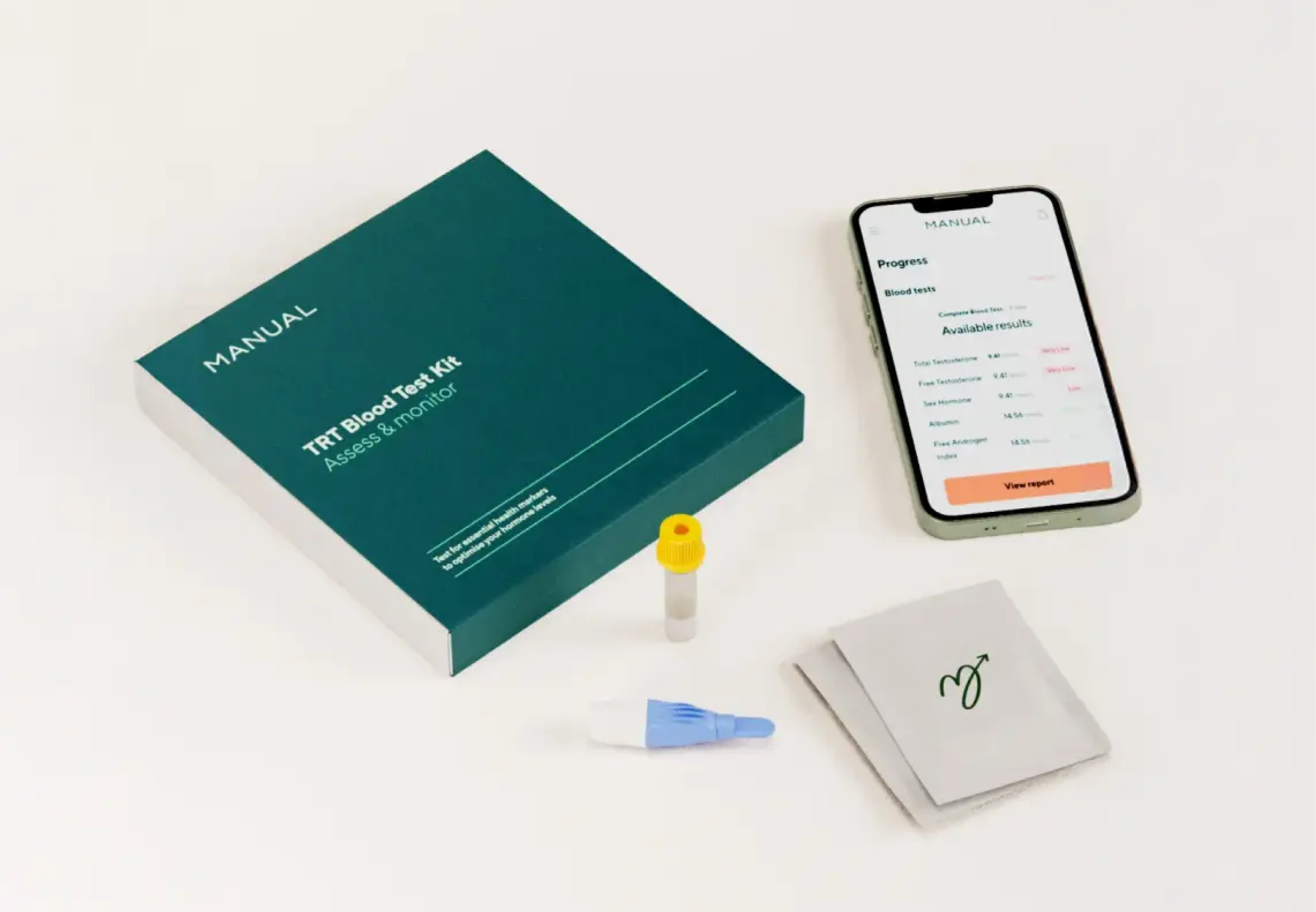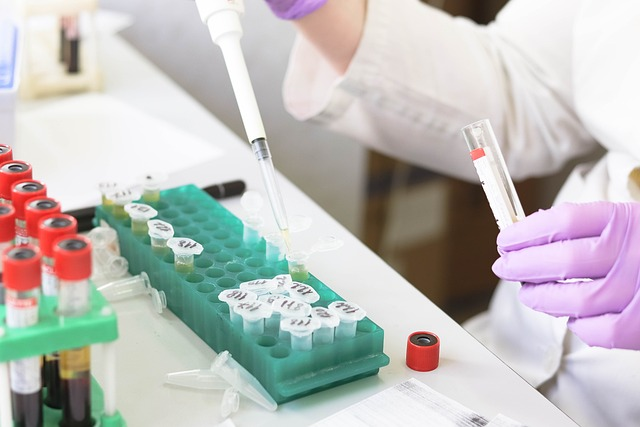Low testosterone levels can impact your daily life, causing symptoms like tiredness, fatigue, decreased muscle mass, brain fog, increased body fat, and low libido (sex drive). If you think you have low testosterone levels, you can visit a healthcare provider or do an at-home testosterone blood test.
Checking your testosterone levels will ensure you get the proper treatment, depending on the results and is the only way to properly diagnosed with testosterone deficiency. Below we look at the best testosterone tests, how to take a testosterone blood test, and what a low testosterone level looks like.

Why is a Testosterone Test Important?
A testosterone test is important because understanding your testosterone level can have important implications on your health.
Mild/moderate symptoms of low testosterone include:
- Changes in mood, stress, or anxiety
- Loss of confidence
- Feeling loss of drive, or “Get up and Go!”
- Brain fog
- Increased body fat
- Low energy
- Tiredness
- Loss of interest in sex.
Moderate/Severe symptoms of low testosterone include:
- Little or no changes during puberty
- A decrease in sperm reduction, which can be checked with a fertility test
- Loss of body hair
- Depression
- Erectile dysfunction
- Loss of muscle mass
- Fatigue
- Increased risk of bone thinning (osteoporosis)
- Increased risk of heart and metabolic disease
- Impaired blood sugars
- Increased risk of overall death
What are the Different Types of Testosterone Tests?
There are two main types of testosterone blood tests:
- An at-home blood test done through a finger prick.
- A venous blood test carried out by a doctor or nurse at a healthcare facility.
A total testosterone blood test will usually check that your testosterone levels are in normal range. They can also check for other hormones relating to testosterone regulation and production, such as pituitary brain hormones. This can help a healthcare professional with a diagnosis, as other hormonal imbalances can cause low testosterone and may be treated in a different way.
How to Prepare for a UK Testosterone Test?
A testosterone blood test should be done in the morning unless you are over 40. This is because in younger men there is a natural peak of testosterone in the early part of the day, but as we age this spike plateaus out.
If you are doing an at-home blood test, make sure your fingers have not been in contact with any hormone supplements, including natural testosterone boosters, for at least two weeks. Hormone supplement remnants can remain on your fingers for some time, which can potentially influence your results, (although in reality most of them do nothing anyway).
What is Included in a UK Testosterone Test?
The best testosterone home test kits will have everything you need to complete the test. This includes detailed instructions on completing the test correctly.
The test will also include:
- A few lancets: This is a device that will prick your finger to draw a small amount of blood.
- Blood sample bottle: You will use this to collect your blood sample. The bottle will have a line which indicates the level it needs to be filled to for the lab to accurately test your blood.
- An alcohol wipe: This should be used before the sample to clean your fingers and improve the accuracy of the test.
- Labels: Small labels will be included which should be attached to the sample bottle. This will make sure the lab knows which sample belongs to who.
How do I use a Testosterone Home Test Kit?
To order and get a testosterone test kit, you will need to complete a questionnaire and fill in some details. This will be used to check that a testosterone test is the right choice for you based on your symptoms. You can then order the test to your home which can fit straight through your letterbox.
Open the test and follow the instructions provided. You will need to clean your finger with the wipe provided before using the lancet to take a small sample of blood.
Once your blood sample bottle is filled to the line, you can seal the bottle and add any labels. Return your sample to a lab (there should be an envelope provided with your test kit). Once your sample is tested, your results will be available, usually through an online portal.

How to Interpret the Results of a UK Testosterone Test
Your results will be available within two to three days after your blood sample has arrived at the lab. If you do a test through the NHS, the waiting time is usually longer. A testosterone test measures the testosterone levels in your blood in ng/dL (as seen above). It is important to make sure this test includes both free testosterone and total testosterone.
Total testosterone is the amount of testosterone in your blood, including testosterone attached to proteins. Free testosterone is the amount of unbound or “usable testosterone" and is an important number, especially in those men who are told their total testosterone levels are normal. In a healthy adult male with normal hormone levels, only about 2-3% of testosterone is actually free and available.
Your doctor will talk to you about what each result means, or there will be a detailed explanation with your test results. If your result is lower than normal or borderline, it’s recommended to take a second test after four weeks.
What are Normal Testosterone Levels?
Until recently, it was suggested that testosterone levels peak until the age of 30 and then gradually drop by 1% per year. However, this is now outdated, and there is now good evidence that in fact although there is a small drop as we age, our total testosterone levels do not naturally decline much as we get older. However, our binding proteins go up as we age, and this means our free testosterone will decrease throughout our lifetime. Of course, multiple minor medical and lifestyle factors will also impact our testosterone production at any point in our lives.
Normal testosterone levels are usually classed as 12-30nmol/l in any fit and healthy man over 18.
If you have other conditions such as type 2 diabetes and symptoms we would class <15nmol/l as abnormal.
In addition to total testosterone, anyone who has a free testosterone < 0.225nmol/l should also be considered as having low testosterone levels.
What Can Affect Testosterone Levels?
There are a number of things that can affect male testosterone levels, such as:
- A hormonal imbalance
- Stress levels
- Alcohol consumption
- How much exercise you do (too much or too little)
- Weight, including obesity or extreme weight loss
- Age
- Simple medical conditions such as asthma, kidney disease, high blood pressure, type 2 diabetes
- Medications such as certain pain killers, antifungals, antidepressants and even some asthma medicines
- A medical condition which affects testosterone, such as mumps
- Injury to the testicles
- Certain medications, like prostate cancer treatments and chemotherapy
- Use of anabolic steroids
Are There Any Risks Associated with a UK Testosterone Test?
There are no risks associated with taking a testosterone blood test. Whether you choose to visit a healthcare professional or carry out a home test, a blood test is very straightforward and safe.
Frequently Asked Questions About UK Testosterone Tests
Below are some frequently asked questions about testosterone testing and treatment options.
Will I be able to get treatment if I get tested?
Yes, but only if your testosterone levels are low and require treatment. If your testosterone levels are not low and you have symptoms, you should seek medical advice for further testing to find the cause.
What treatment is available for low testosterone?
Prescription testosterone treatment is available both privately and through the NHS. This is called testosterone replacement therapy (TRT) and can be used to maintain a normal testosterone level.
Can a testosterone test be used for fertility?
Although testosterone can impact fertility, a testosterone test cannot check your fertility levels. If you want to know more about your chances of conceiving, you should take a male fertility test instead.
Can I take a testosterone test if I’m already taking testosterone replacement therapy?
A testosterone test can be a great way to check whether your testosterone therapy is working as it should. Your doctor should regularly monitor your testosterone levels if you are on TRT, but you can always check it at home if you don’t want to wait. However, there are other more sophisticated ways to test if someone is taking external testosterone.



